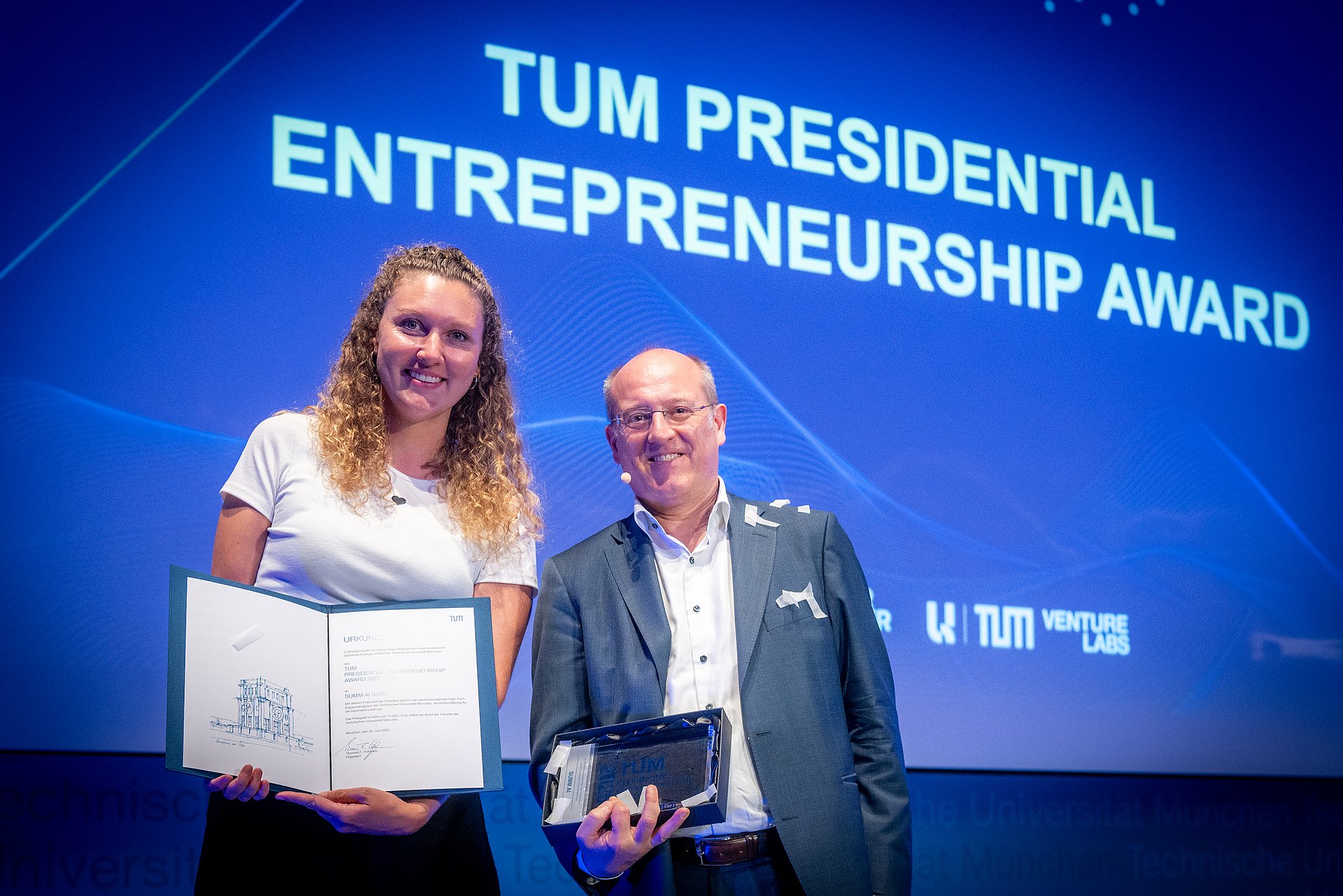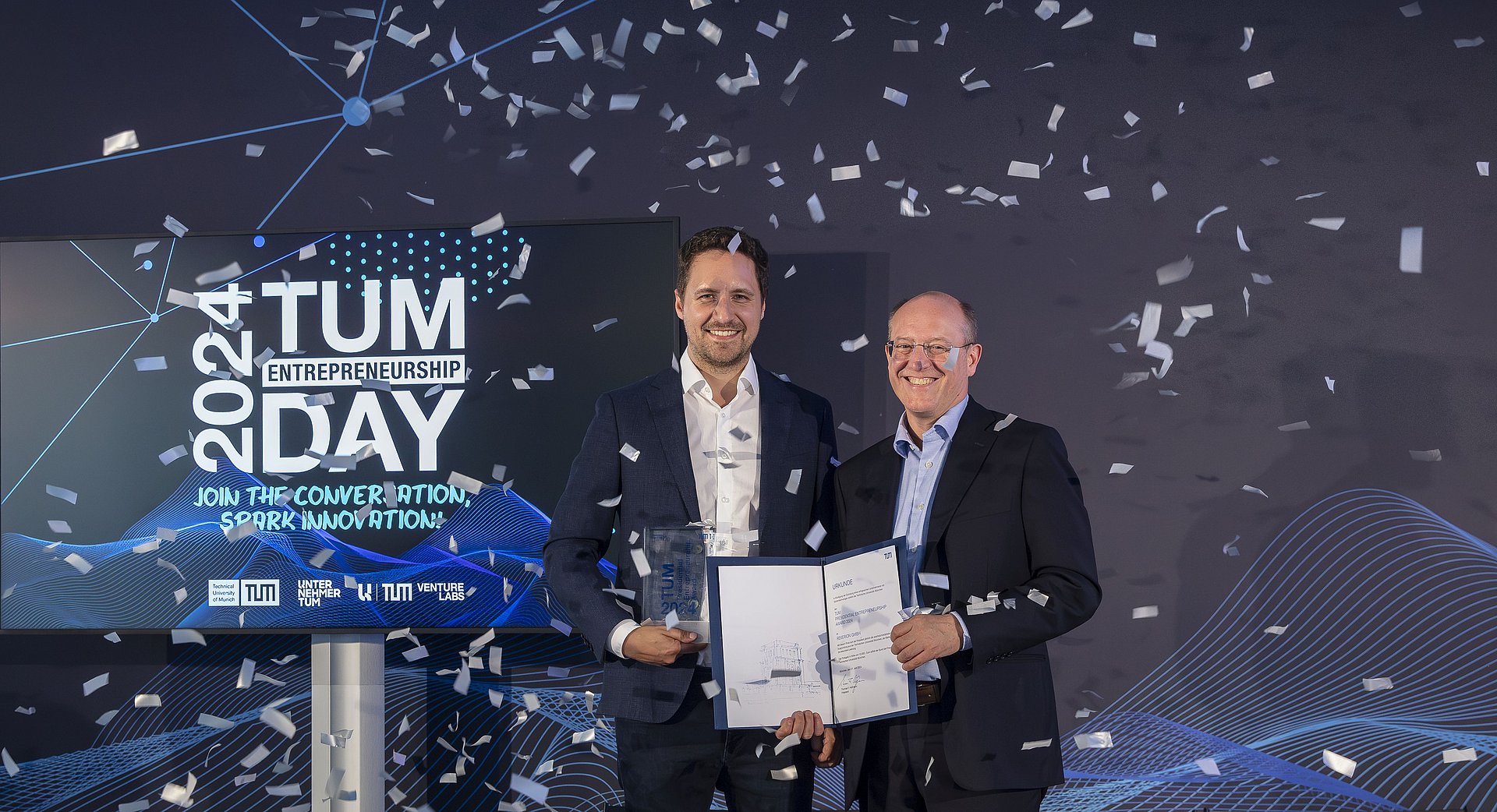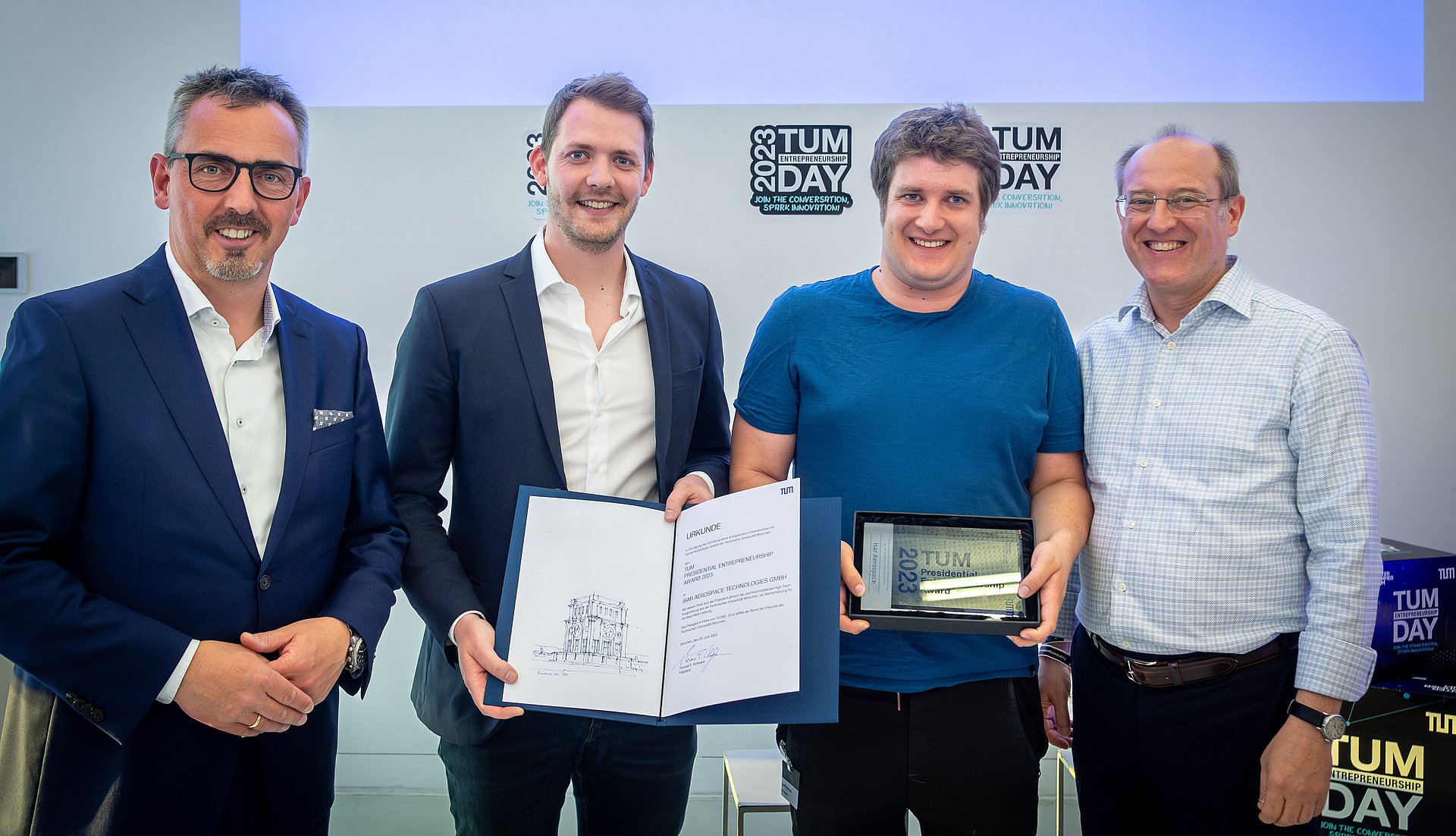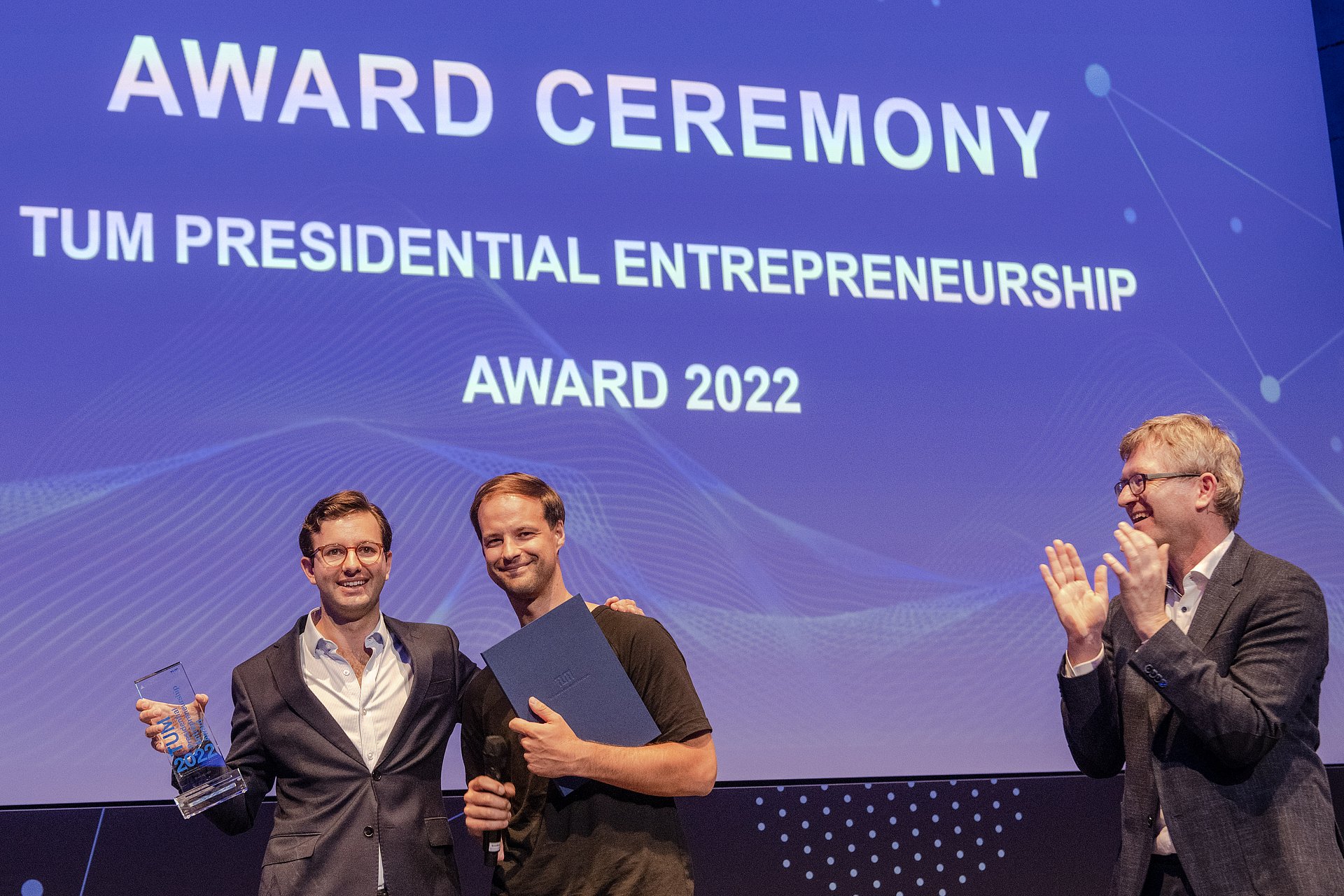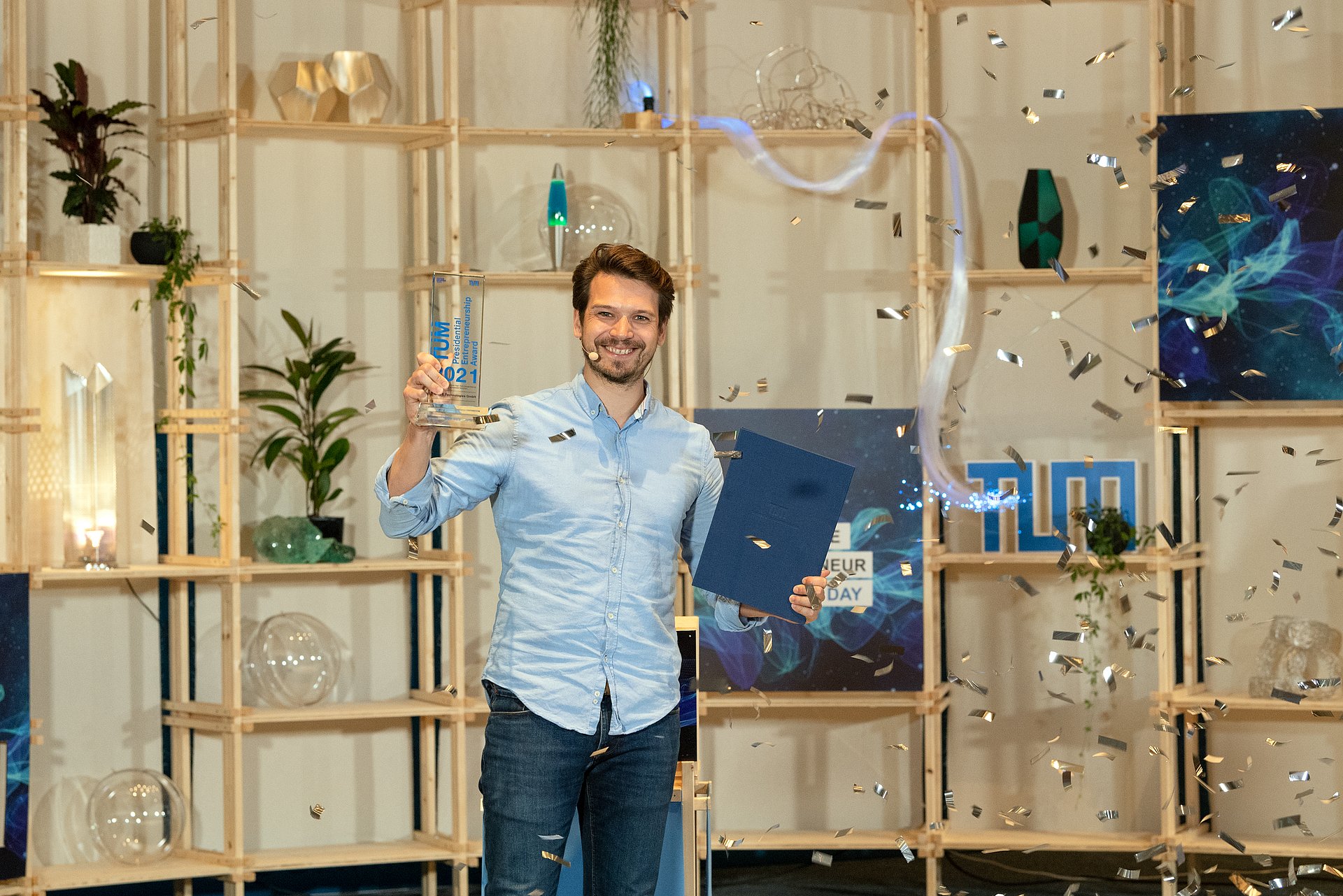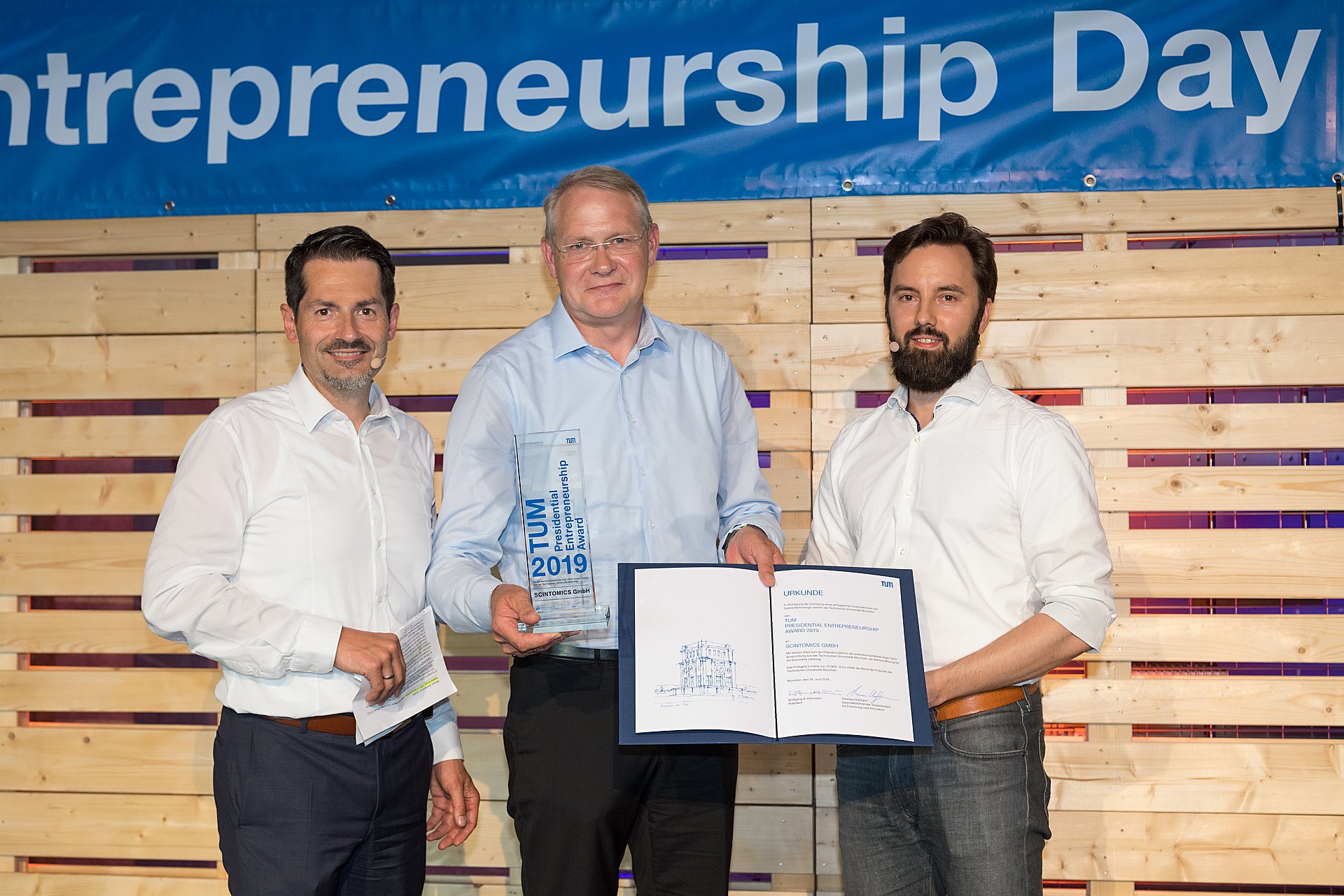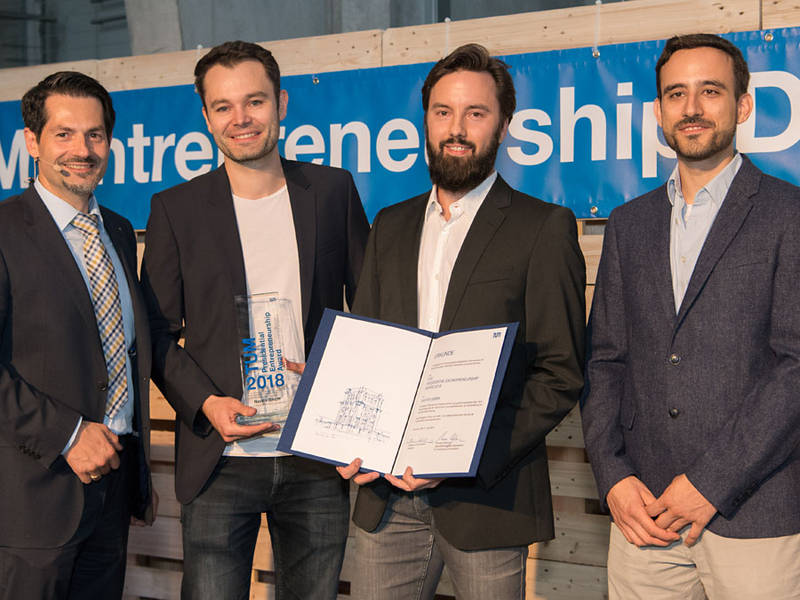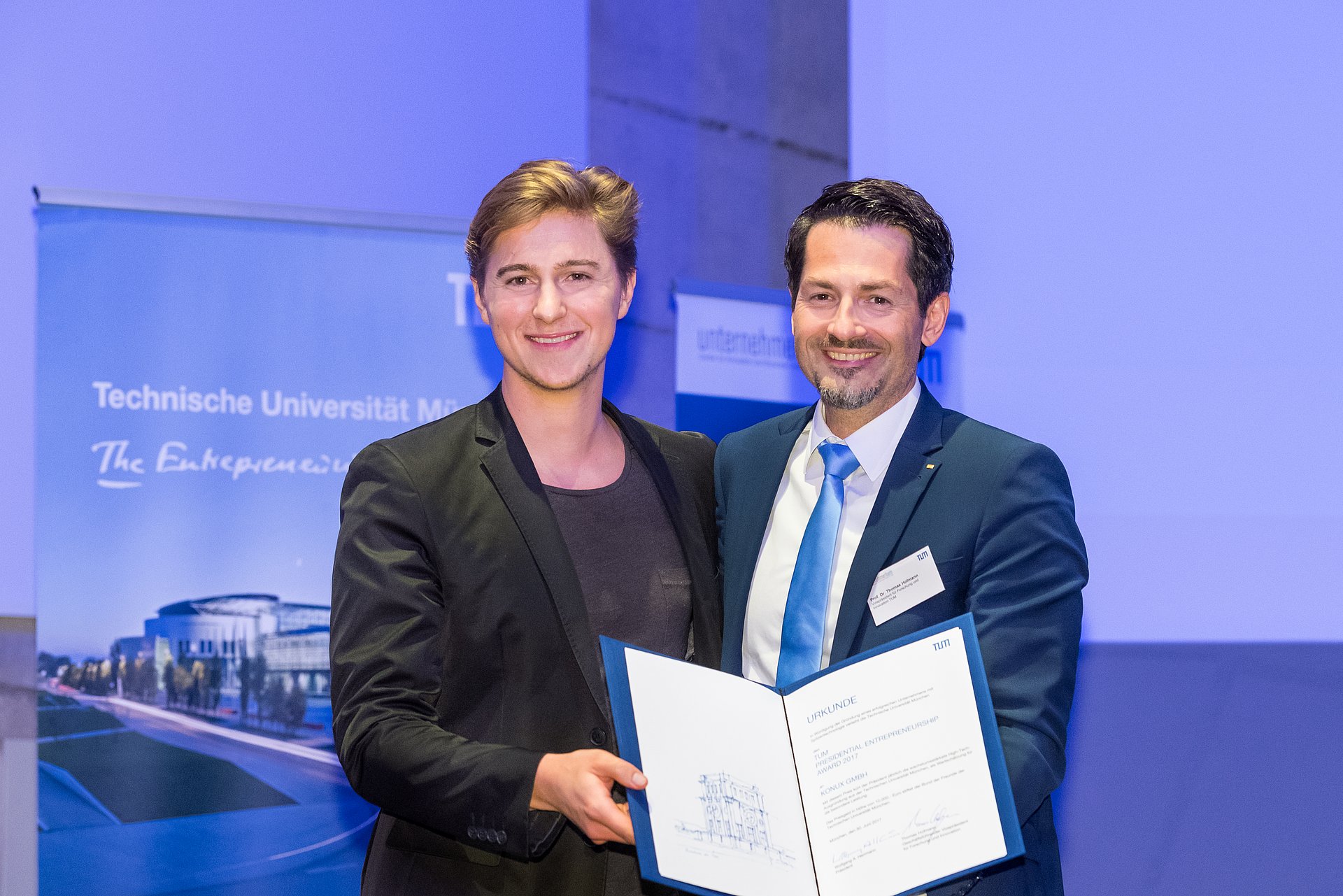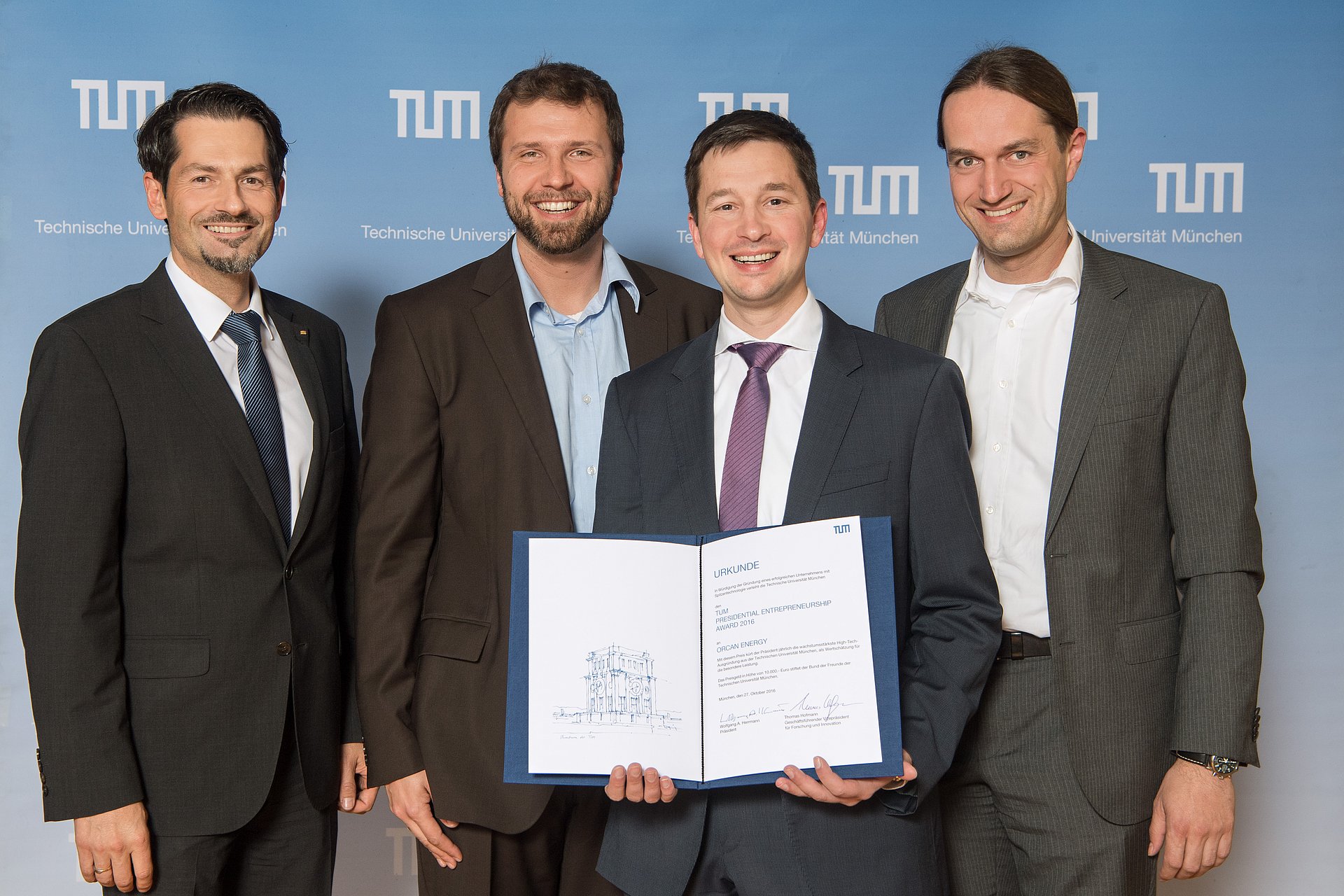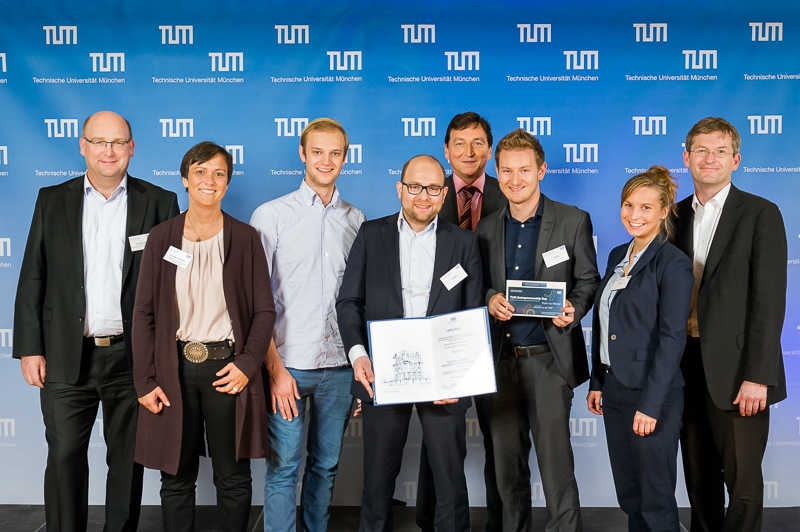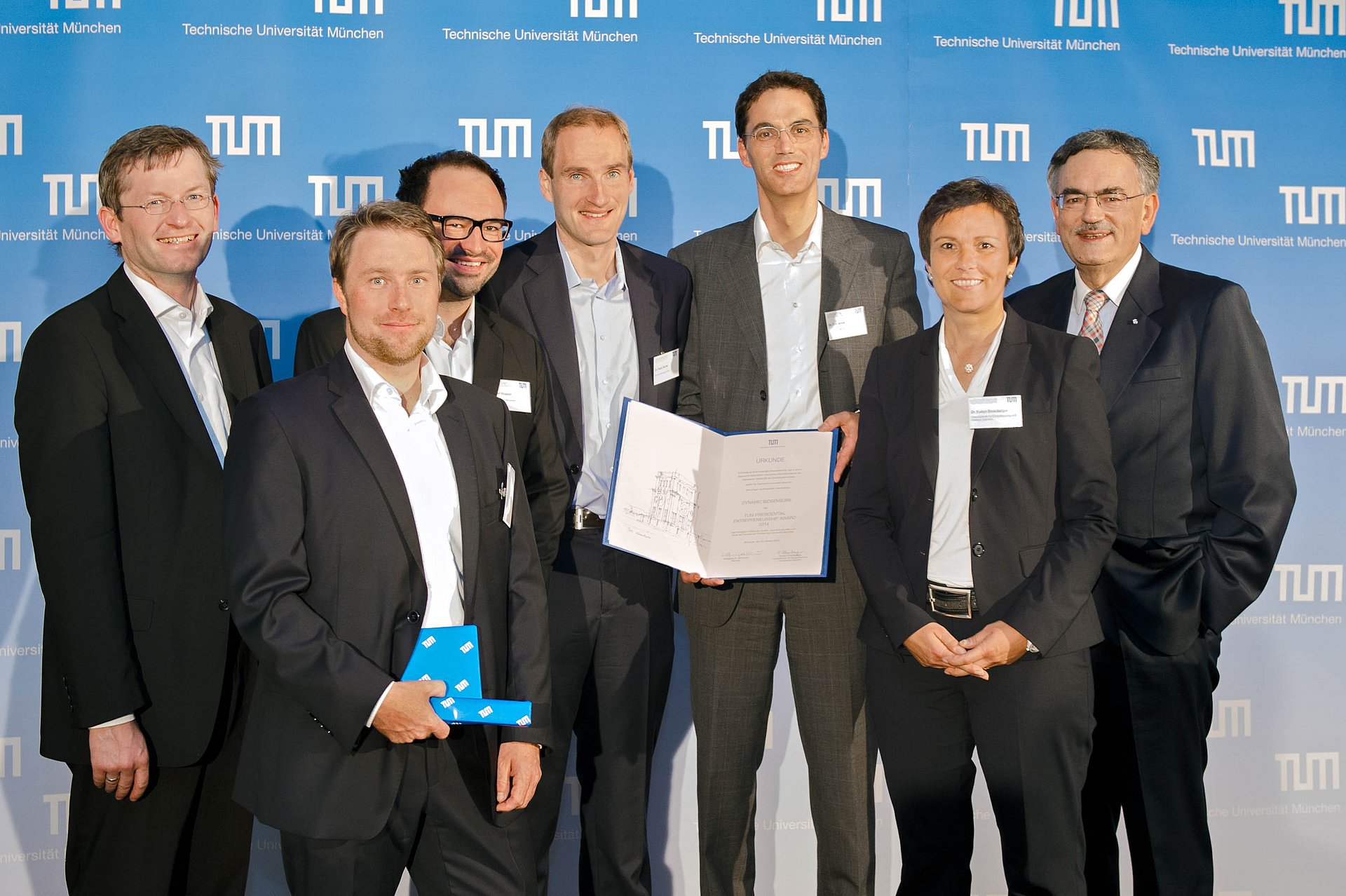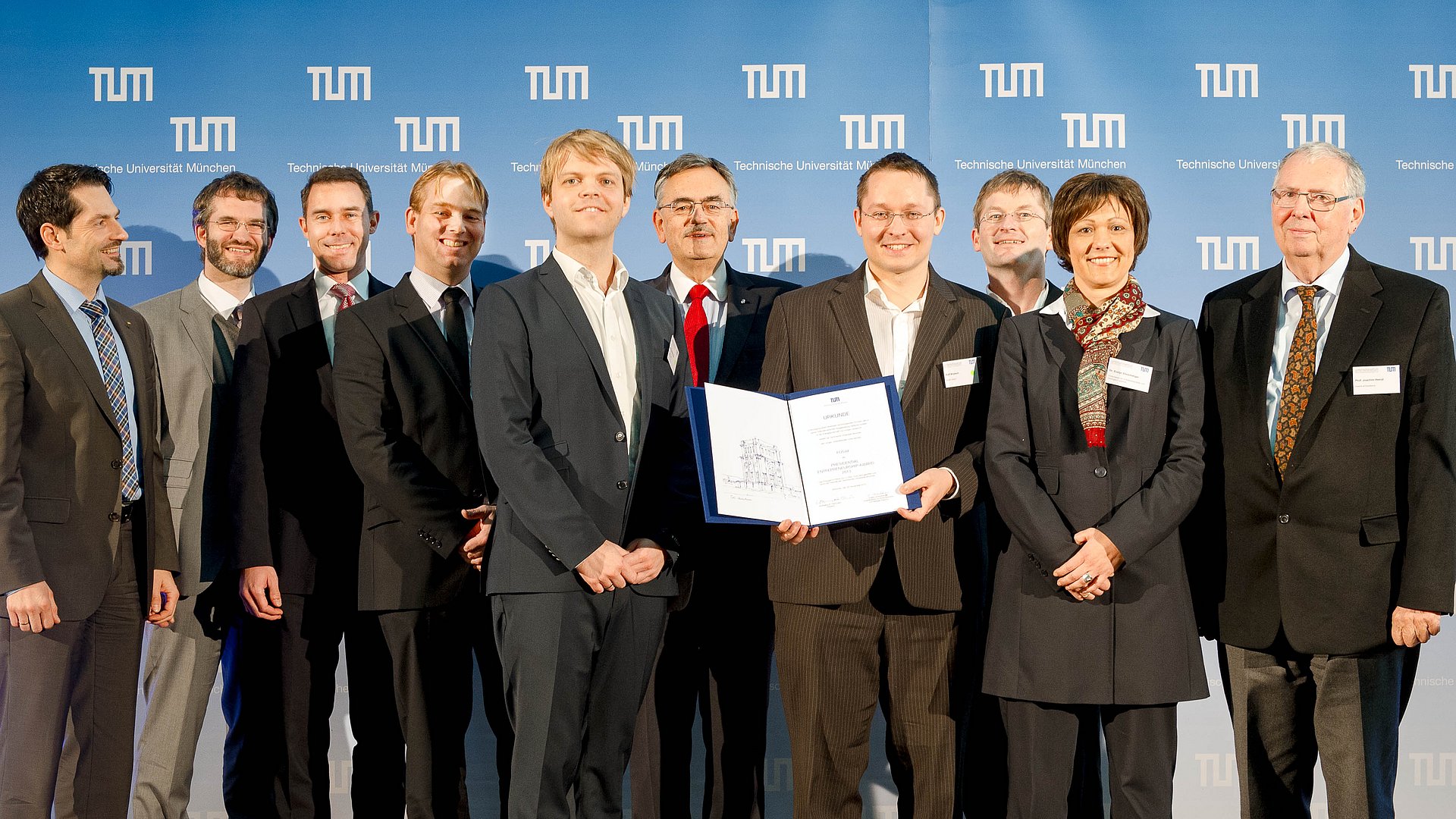TUM Presidential Entrepreneurship Award
This award honors university Spin-offs that have established themselves as successful and impact driven companies, based on research work and entrepreneurial spirit of its founders.
![[Translate to English:] [Translate to English:]](/fileadmin/_processed_/0/7/csm_20220630_Entrepreneurshipday_AH_694993_63b4191ae8.jpg)
The TUM Presidential Entrepreneurship Award (PEA) has been awarded since 2013 to outstanding spin-offs of the university whose business ideas are significantly based on research results of TUM. Further criteria are secured initial financing and a high growth potential of the company.
Above all, our appreciation is due to the innovative and successful companies that are role models on the way to a sustainable transformation of society and remain connected to future students, scientists and founders.
The award is presented during the TUM Entrepreneurship Day and is endowed with 10,000 euros, donated by the Freunde der TUM e.V..
The TUM Presidential Entrepreneurship Award in review with a presentation of the three final Spin-offs within the PEA-film:
For many people it is difficult or impossible to understand complex texts. These can include people with learning difficulties, the elderly or those with limited knowledge of German. Consequently, German public-sector bodies and, more recently, companies in the EU are required to provide fully accessible and understandable information. Because simple language follows specific rules, texts have generally required expert input, resulting in considerable effort and expense for public authorities and companies. The start-up SUMM AI, formed in 2022, has developed a tool that uses AI to translate texts into simple language in a matter of seconds. It can also add suitable illustrations.
The founding team, Flora Geske, Vanessa Theel and Nicholas Wolf, all studied Finance and Information Management at TUM. The start-up received support, among other sources, from the TUM Venture Lab Software & AI and the UnternehmerTUM programs XPLORE and XPRENEURS.
Finalist: KEWAZO
The transport of materials on large construction sites can be a complex operation that can quickly pose safety risks for workers. The start-up KEWAZO has developed a robot that automatically moves heavy materials to the correct location. It is used for such tasks as erecting scaffolding and building industrial plants. This can eliminate the need for cranes and replace many manual steps for improved safety. In addition, the system collects and analyzes data for project management.
The founders Ekaterina Grib, Artem Kuchukov, Leonidas Pozikidis, Eirini Psallida and Alimzhan Rakhmatulin, who studied construction technology, informatics and management at TUM, met at the Think.Make.Start hackathon. The team received support in the XPRENEURS incubator program and TUM’s US Venture Program, among other sources. The start-up, which was formed in 2018, also has an office in the USA.
Finalist: Phlair
The start-up Phlair, founded in 2022, has developed a new technology to remove CO2 from ambient air. The core element is the hydrolyzer, an innovative electrochemical cell that produces acids and bases needed for the direct air capture process. The system can operate with solar power and uses significantly less energy than previous technologies. The captured CO2 can be used as a raw material in various industrial applications. In this way, the technology can help companies achieve climate-neutral production.
The founders Malte Feucht, Steffen Garbe and Paul Teufel studied chemistry, robotics and management at TUM. The team received support in the TUM Venture Lab ChemSPACE.
The Reverion team has developed a gas-fired power station with numerous advantages as compared to earlier plants: It is more efficient, can sequester CO2 and, in addition to generating electric power, can use surplus power.
Reverion currently focuses on highly efficient biogas plants, for which it boasts an 80% efficiency rating. When there is surplus power in the grid, for example from wind or solar energy providers, the system can rapidly switch from power production to power utilization. It then produces hydrogen or methane to store energy and stabilize the networks. The power plants are operated in standardized and scalable container units.
The start-up, founded in 2022, emerged from a research project at the Chair of Energy Systems. It was supported in the TUM Venture Lab ChemSPACE, the XPRENEURS incubator program and the TechFounders accelerator program at UnternehmerTUM. Reverion is now successfully working in the market with more than 100 employees.
Finalist: Planet A Foods
Planet A Foods reached the final of the Presidential Entrepreneurship Award. The team has developed a process for making a cocoa-free alternative to chocolate using domestically grown plants. With oats, sunflower seeds and other ingredients, the start-up makes a product that tastes like chocolate and can be used in the same way for further processing. The advantage over cocoa beans: less water consumption, no risk of deforestation, and a big reduction in ‘food miles’. The company has calculated that this can reduce the carbon footprint by around 90%.
The start-up team completed doctorates or studied at the Chair of Food Chemistry and Molecular Sensory Science or at the Department of Mechanical Engineering. It received support in the TUM Venture Lab Food Agro Biotech. Established in 2021, Planet A Foods already has many large confectionary producers as customers.
Finalist: RobCo
Despite labor shortages and the struggle to remain competitive, many small and midsized enterprises (SMEs) are slow to acquire robots due to the high costs and potential complexity. For these companies, RobCo has developed a plug-and-play robotic system that is easy to install and intuitive to operate. The software can also be used without specialized skills. Thanks to their modular structure, the robots are suitable for versatile uses in a wide range of applications, including in the Internet of Things. The start-up also offers leasing arrangements.
Four years after its launch, RobCo is already successful at the international level. The technology is based on research at the Chair of Robotics, Artificial Intelligence and Real-time Systems. Support for the founders came from the XPRENEURS Incubator and the Center for Digital Technology and Management (CDTM), among other sources.
From communication networks to autonomous driving or digital agriculture: for dozens of new technologies, satellites are needed for data communications. To make this possible, providers want to fire entire swarms of satellites into space. They will be relatively small and will move in low orbits. But existing rockets used for satellite launches are designed for much larger payloads. Especially in Europe, the launch resources for the new generation are scarce and expensive.
Isar Aerospace has developed a launch vehicle tailored to small and midsized satellites that will facilitate efficient transport. The start-up not only produces the technology. It will also organize the launches for customers.
The founders Daniel Metzler, Josef Fleischmann and Markus Brandl studied aerospace at TUM and worked on rocket engines in the student research group WARR. After starting their company in 2018, they built their first prototypes in the MakerSpace high-tech workshop. At UnternehmerTUM they also received support in the XPRENEURS incubator. Unternehmertum Venture Capital Partners invested in the start-up along with various other investors in several funding rounds. Isar Aerospace now has around 350 employees in Ottobrunn near the TUM Department of Aerospace and Geodesy. The start-up is planning to launch its first rocket before the end of this year.
Finalist: Fernride
In the logistics industry in Europe, thousands of positions as truck drivers are unfilled. Fernride aims to solve this problem with tele-operated vehicles. Trucks equipped with the company’s technology can be operated from a central office. One person is able to control several semi-autonomous vehicles. Customers use the trucks on plant sites, at transshipment centers and in ports. The company plans to increase the autonomy of the electric trucks so that larger numbers of vehicles can be controlled by a single human operator – also on public roads.
The founders, Dr. Maximilian Fisser, Jean-Michael Georg and Hendrik Kramer, studied at the TUM School of Engineering and Design and the TUM School of Management. Their technology is based on research at the Chair of Automotive Technology. The team received support under various UnternehmerTUM programs. The start-up was formed in 2019 and has successfully completed several funding rounds.
Finalist: Tanso Technologies
Large companies in the EU will have to calculate and disclose their CO2 emissions in the near future. This is challenging for many businesses, especially those that produce diverse products and have complex structures. It will take considerable effort to collect data and generate comparable performance indicators. Tanso Technologies has developed software that calculates CO2 emissions for the entire company and on a product-by-product basis. This will not only save working time, but will also enable companies to analyze individual production stages for potential improvements.
The technology is based on the thesis submitted by TUM student Gyri Reiersen for her master’s degree in robotics, cognition, intelligence. After completing his studies in management, co-founder Till Wiechmann attended the Entrepreneurial Masterclass, where students combine the research topic of their master’s thesis with their own start-up project. The two founders completed the add-on degree program at the Center for Digital Technology and Management (CDTM), where students form interdisciplinary teams can design new technologies, develop concrete products and prepare to launch a company. The team, which also includes co-founder Lorenz Hetzel, received support from UnternehmerTUM’s XPRENEURS incubator and venture capital fund.
Video presentation of final Spin-offs
For patients with chronic diseases, it is often important to do gymnastics or breathing exercises at regular intervals. It is not always possible to have the support of a therapist. Experience shows, however, that patients at home do not always perform the exercises correctly. Kaia Health has developed an app to support the treatment of various chronic conditions. It uses computer vision technology to monitor the exercises with a phone camera and offer corrective tips. In addition, users can interact with their physiotherapy practice or doctor’s office. So far the app offers therapeutic support for back pain and chronic obstructive pulmonary disease (COPD), with further applications planned.
With their product, Konstantin Mehl, a management graduate, and Manuel Thurner, an informatics graduate, hope to relieve pressure on the healthcare system. They received support from the Center for Digital Technology and Management (CDTM), which offers a supplementary degree program in which students work in interdisciplinary teams to design new technologies, turn them into real products and prepare to establish companies. Since it was founded in 2015, Kaia Health Software has completed several rounds of financing. Today it has more than 200 employees and an office in New York.
Finalist: KEWAZO
The assembly of scaffolding is a physically demanding and often dangerous job. This has made it increasingly difficult to recruit workers. KEWAZO has developed a robot that automatically transports the materials and independently navigates the site. The battery-operated robot, which is easy to install, helps companies to overcome the skills shortage, improve workplace safety and save assembly costs. In addition, the technology analyzes operational data for improved project management.
The start-up team, made up of graduates in building robotics, informatics and management, first met at the Think.Make.Start Hackathon. They received support under several TUM and UnternehmerTUM programs, including the US Venture program and the XPRENEURS incubator program. Today KEWAZO is selling its product not only to construction companies but also large industrial plants and shipyards.
Finalist: Kiutra
The use of quantum mechanics effects is currently yielding entirely new and more powerful technologies. However, such applications usually require ultra-low temperatures. Kiutra has invented a magnetic cooling technology that can create those conditions without requiring ultra-cooled liquefied gases such as the rare and expensive helium-3. The product is suitable for long-term use and thus for industrial applications. In addition, the company offers highly automated instruments for rapid tests at low temperatures.
Kiutra was formed in 2018 by four scientists from the Chair for Topology of Correlated Systems. They received support from the TUM Start-up Consultancy and through several UnternehmerTUM programs. The start-up has successfully completed several rounds of private funding and now has more than 30 employees.
Video presentation of final Spin-offs
The performance of batteries is a decisive factor determining whether renewable energy sources and electric vehicles can be widely used in the future. TWAICE has developed software for the optimization and analysis of lithium ion batteries. The various functions of the product can be used throughout the lifetime of a battery: Companies can improve product development, plan strategies for efficient applications and monitor the condition of batteries in use.
The basis of the technology, which applies machine learning methods, was developed at TUM by founders Dr. Michael Baumann and Dr. Stephan Rohr in their doctoral theses. The establishment of TWAICE in 2018 was supported by TUM and UnternehmerTUM through the XPRENEURS incubator program, among other resources, and with an investment by UVC, the venture capital fund of UnternehmerTUM. TWAICE now has 70 employees.
Finalist: Retorio
Even professional managers and HR departments do not always succeed in ignoring their gut feelings about job applicants or such characteristics as age, gender or skin color. Retorio has developed software to bring about a more objective and rapid personnel selection process. In videos, the technology uses artificial intelligence to recognize language, voices and gestures and analyze them using psychologically well-founded models. Applicants can also use the tool to prepare for job interviews.
Dr. Christoph Hohenberger and Dr. Patrick Oehler prepared their start-up as doctoral candidates at the Chair for Strategy and Organization. The TUM Incubator and the UnternehmerTUM Techfounders program helped them to launch the company in 2018. Today Retorio has more than 20 employees.
Finalist: Capmo
Construction sites still tend to be underdigitized. This can lead to inefficient processes and higher costs. Capmo has developed software for the digital management of all construction site processes, enabling companies to cooperate seamlessly and extract data on their projects. For the client, the processes are more transparent. Capmo is geared to the needs of mid-sized companies, which make up the majority of construction firms.
The founders Florian Biller, Dr. Patrick Christ, Florian Ettlinger and Sebastian Schlecht first met at the Center for Digital Technology and Management (CDTM). This joint institute of TUM and LMU offers a supplementary degree program in which students work in interdisciplinary teams to design new technologies, turn them into real products and prepare to establish companies. The start-up received support from the UnternehmerTUM programs EIT Climate KIC and XPRENEURS, among other sources, as well as funding from UVC. Capmo has around 60 employees.
Video presentation of final Spin-offs
Scintomics has been selling and installing fully automated production systems for established radio-pharmaceuticals in clinical facilities around the world since 2006. In recent years Scintomics has been capturing increasing shares of the pharmaceuticals sector with highly-innovative radio diagnostics and therapeutic solutions, most of which have been developed and patented at TUM. Scintomics accompanies the entire process from production all the way to regulatory approval of new radio-pharmaceuticals. TUM is also the hub of the expertise behind the company's interdisciplinary entrepreneurial strategy: Its founder Prof. Hans-Jürgen Wester holds the TUM Chair of Pharmaceutical Radiochemistry, while CEO Saskia Kropf is a TUM graduate in Mechanical Engineering.
Finalist: DyeMansion
The second place goes to DyeMansion GmbH. The company develops industrial solutions for finishing and coloring powder-based, 3D-printed plastic parts. The overall procedure is referred to as "Print-to-Product" and covers the entire refinement process from the unmachined part to the finished product.
One of the company's two founders studied Mechanical Engineering as well as Management and Technology at TUM and helped create the company with the assistance of TUM start-up consultants. UVC Partners, UnternehmerTUM's independent venture capital company, invested in DyeMansion in 2018.
Finalist: Agrilution
Agrilution's vertical mini-greenhouse with seedmats and an app lets customers grow lettuce, herbs and vegetables in the smallest possible amount of space. Both of the company's founders studied at TUM, received TUM start-up consulting and participated in the Climate-KIC start-up accelerator. One of the initiative's first partners, TUM has played a central role in this European innovation network for reducing climate change since its founding by the European Institute for Innovation and Technology.
Video presentation of final Spin-offs
On a smartphone NavVis lets users find their way easily in complex building units such as plant halls, convention centers, airports, train stations and shopping centers. It also makes it possible to experience entire exhibitions online. To do this, the company digitalizes indoor spaces using mobile trolleys equipped with a variety of cameras. The footage is used to create photo-realistic 3D maps of buildings exact to the centimeter. This data is supplemented with a navigation system and interactive location-specific services.
The technology for a camera-based navigation system was developed by Georg Schroth, later one of the company's founders, during his doctoral studies at the TUM Chair for Media Technology. The first to join the subsequent research project were the doctoral candidates Sebastian Hilsenbeck and Robert Huitl, followed by Economics PhD graduate Felix Reinshagen. The four founded NavVis in 2013 with the support of TUM and UnternehmerTUM, Center for Innovation and Business Creation, for example in the KICKSTART program for entrepreneurial qualification.
In addition to basic research and start-up consulting, TUM also played a role in the majority of technical developments. Thus for example the trolley prototypes and the company's corporate design were created in collaboration with the Chair for Industrial Design.
Finalist: ParkHere
ParkHere simplifies the parking process for drivers and parking lot operators alike with a combination of smart hardware and software that learns. All three ParkHere founders are TUM graduates and worked on the development of the sensor and business planning in their Bachelor's thesis projects. The EXIST start-up grant gave them the opportunity to continue developing their idea to a mature business concept and ultimately to spin it off. Today the company has a headcount of 30 employees and has already equipped more than 10,000 parking spaces with sensors.
Finalist: Customized Drinks
Bored by the classic assortment of available beer, Dominik Guber, Ping Lu and Wolfgang Westermeier came up with the idea of marketing a do-it-yourself beer brewing kit. As part of the UnternehmerTUM Manage&More subsidy program the three TUM students initially developed the concept of the "Braufässchen" or mini-brewing keg. Today the company also sells other kits for producing foods and beverages at home.
The track network of the German railway system has 66,454 switches. If just one of them fails, the effects can ripple through the entire system. To avoid this, the switches require regular maintenance. But how is it decided which one is due for a visit? And what happens if a malfunction occurs long before the scheduled maintenance date? The systems offered by KONUX could be the answer.
The three founders of the start-up, Andreas Kunze, Dennis Humhal and Vlad Lata, met while studying at TUM. They worked together to create highly precise and robust smart sensors. Combined with analysis software based on artificial intelligence, their sensors make up a system that can monitor switches in real time and predict maintenance requirements. This helps to avoid downtime through unscheduled repairs and delays caused by unnecessary maintenance work. The principle can be applied to many types of industrial facilities.
KONUX, which was established in 2014, has defined the networking and digitization of railway structures as a key business area. The company has since attracted major corporations as customers, completed several rounds of funding, and received numerous awards.
Finalist: ProGlove
ProGlove develops work gloves with built-in scanners that can be used by workers in industry and logistics. The gloves deliver optical, acoustic and haptic feedback, eliminating the need to carry an extra sensor, thus leaving both hands free to work. They are already being used by several major industrial customers.
Finalist: eGym
The start-up eGym produces fully electronic strength training equipment now installed in more than 650 fitness studios in Germany and other European countries. With software specifically developed for the equipment combined with mobile apps, athletes can develop customized, highly efficient training programs. Florian Sauter, one of the founders of eGym, who is now in charge of the company's research and development, studied at the TUM Department of Electrical and Computer Engineering.
Video presentation of final Spin-offs
Enormous quantities of energy go unused in industry and traffic each day because of heat loss. In order to be able to recycle this heat, a team from TUM developed a new technology. The device can be hooked up to generate electricity in factories or biogas facilities, in freight trucks and ships, as well as in construction machines. It works much like a steam power station, only with organic fluid used instead of water.
The principle itself, referred to as Organic Rankine Cycle (ORC), is not new, but is already used in large power plants. So far, however, there has not been a technology that could efficiently make use of small amounts of waste heat at low temperatures and that could also operate without a great deal of upkeep while being affordable for a large number of users.
Richard Aumann, Dr. Andreas Sichert, and Dr. Andreas Schuster from the Chair of Energy Systems have solved several technological problems associated with power plants since 2004 – giving rise to 20 different patents. In 2008 they founded Orcan Energy, and in 2013 they introduced their first product on the market. They now have not only the support of a prominent venture capitalist from Silicon Valley, but they have also won over a large energy supplier as a strategic partner. Their technology is already in use in several European countries.
The jury of the TUM Presidential Entrepreneurship Awards was impressed that the team deliberately took a considerable amount of time for product development based on their research results before in-troducing the product to the market. “This has allowed the company to now offer a product with a high level of quality that taps into a previously unutilized CO2-neutral source of energy – with immense poten-tial for society,” Prof. Thomas Hofmann, Executive Vice President for Research and Innovation at the TUM, said in his laudatory speech at the TUM Entrepreneurship Day yesterday.
Finalist: INVENOX
Invenox has developed a new design for energy storage devices. It allows the battery modules to achieve very high energy density and a long service life. Production is more cost-effective and defective battery cells can be easily exchanged.
Finalist: KINEXON
Kinexon has developed sensor networks for locating and tracking the movement of people and objects with precision within centimeters. The wireless technology and an analysis tool make it possible to use the technology in a wide variety of areas, from process monitoring in smart factories, through to training evaluation in sports and monitoring of events.
Companies' IT systems conceal endless quantities of data on the daily processes that take place in the different areas of the organization. Process mining, otherwise known as automated business process discovery, is the method by which this process data can be brought out into the open and analyzed in order to bring greater transparency into the complex business processes, thus enabling them to be improved.
This is exactly the type of technology that Martin Klenk, Bastian Nominacher and Alexander Rinke developed – based on research results they had worked on as students of Informatics, Finance and Information Managements and Mathematics at TUM. Their software can be deployed in all systems and can analyze company processes in real time. The graduates founded Celonis in 2011, and the start-up is already the world's number one in process mining. Companies from a dozen industry sectors and several different countries number among their customer base, including major global enterprises. Celonis has seen its revenues more than double every year and currently employs a staff of around 60.
The Celonis team received support from TUM's start-up consultation service and funding from an EXIST start-up grant under which the university provides a mentor and a number of workstations. It wasn't only in the start-up phase that the entrepreneurs were closely involved with the university; they are still in touch with various institutes and departments today. They are also involved in several TUM programs on entrepreneurship and career guidance, where they are also role models for students considering founding their own company.
Finalist: ImevaX
ImevaX GmbH develops highly specialized vaccinations against infectious diseases that are prevalent around the world. The company focuses on the Helicobacter pylori bacteria, which can cause gastric ulcers and stomach cancer. The team headed by Markus Gerhard, Professor at the TUM Institute for Medical Microbiology, Immunology and Hygiene, received support from the TUM's start-up consultation service.
Finalist: Magazino
Magazino GmbH builds robots that use 2D/3D cameras to measure and detect objects, as well as grasp them securely. The robots are therefore capable of being deployed in warehouses where they can autonomously bring various different items together – a task still done exclusively by humans to date. Nikolas Engelhard, one of the company's founders, studied Informatics at TUM. Besides receiving EXIST assistance, the team was supported by UnternehmerTUM, the Center for Innovation and Business Creation, and benefited from the "Design Enterprise" program of the TUM Chair for Industrial Design.
The winning company, Dynamic Biosensors, founded out of the Walter Schottky Institute, TUM’s primary institute for semiconductor electronics, developed an innovative biosensor for use in pharmaceuticals research. Using Dynamic Biosensors’ switchSENSE technology to measure molecular interactions enables a multitude of data to be collected at once with a single measurement process. The jury was impressed by how quickly the company managed to establish itself in an industry that traditionally sees long innovation cycles. They were also fascinated by the personal development of the founders and their transformation from basic researchers into entrepreneurs.
Finalist: KONUX
contactless measurement technology
Finalist: NavVis
technology platform for mapping buildings in 3D and for indoor navigation using smartphones
Video presentation of final Spin-offs
The jury crowned fos4X the winner. The company was founded as a spin-off from the Institute for Measurement Systems and Sensor Technology. Certain in the knowledge that the energy revolution is one of the greatest challenges facing our generation, the jury was convinced that fos4X’s measurement systems would make a significant contribution in helping the world succeed in this Herculean task. Their technology allows you to measure the blade load on wind turbines. This helps optimize operational and maintenance costs, a turbine’s life expectancy, investment costs and the yield achieved by wind energy systems. fos4x offers additional fiber optic measurement technology systems as well, such as sensors for fiber-reinforced composites.
Finalist: SurgicEye
Medical devices
Finalist: ZS-Handling
Systems that enable contactless handling of sensitive components
Video presentation of final Spin-offs
